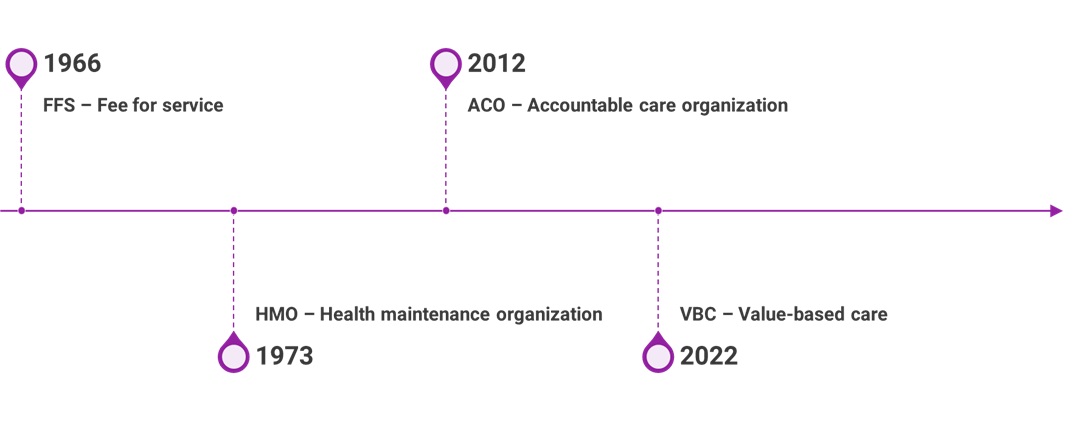Powering Value-Based Care in Healthcare Organizations with Democratized Data

In the first blog of my data monetization series, “Data Monetization: Transform Your Cost Centers into Profit Centers by Leveraging Data Democratization,” I shared in detail concepts and approaches to realizing economic benefit from your data.
In my second installment, “Harness Your Data for Economic Benefit with a Solid Data Monetization Strategy,” I reviewed the strategic framework and operationalization practices, including ownership, storytelling, and defining and measuring value metrics involved in monetizing data.
In this blog, I will share how healthcare plans and providers are approaching data monetization in transforming their organizations from a cost center to a profit center. As a result, healthcare organizations are seeing financial benefits and improved patient outcomes.
The Healthcare Industry’s Approach Towards Data Monetization
Value-based care (VBC) is a comprehensive, coordinated care delivery model being developed and adopted by Medicare, Medicaid and commercial health plans. These models are structured in a way to hold provider organizations more accountable for their patients’ health outcomes. The purpose of VBC is to control costs and increase care quality to maximize value for patients. Designing and operationalizing VBC relies heavily on cost and quality analytics built on accessible, trustworthy, fit-for-purpose data. This not only helps monetize data but also eases regulatory reporting.
Several federal programs have been mandated with aggressive goals to move towards VBC models. This is an organic change for the healthcare industry since the ‘90s, although the concept has evolved over time. VBC is a pivotal shift from the fee-for-service model and health maintenance organizations’ (HMO) volume-based billing. Evidence-based treatment and value-based billing are the new frontier.

Unlike traditional models, value-based care is not possible without clear, data-driven metrics. Measurements must be consolidated from various players in the ecosystem, such as the health plan, provider, patient and other healthcare-related facilities. Data monetization in value-based care models involves:
- Metrics: Providers may need to track and report to health plans on specific metrics like hospital readmissions, adverse health events, population health and patient engagement. They must also demonstrate improvement in patient health.
- Data technology: Providers are incentivized to use evidence-based treatment plans, medicine and health procedures and carefully document patient engagement. Providers upgrade health digital technology, rationalize treatment procedures and leverage advanced data analytics to get additional incentives for their services.
- Patient care and empowerment: The VBC model is aimed at empowering patients to participate in their care plan and receive coordinated, appropriate and effective care. Preventive checks and transparent communication can be part of the data-driven, VBC plan and are therefore compensated by the health plan.
- Federal oversight: To participate in VBC, the Centers for Medicare and Medicaid Services (CMS) developed several models for providers, such as the accountable care organization (ACO), bundled payments and patient-centered medical homes.
- Blockchain: This data-sharing approach allows healthcare systems to preserve and exchange patient data securely and accurately between hospitals, labs, pharmacies and physicians.
The value-based, total cost of care, or capitated models, are data-driven and democratized. They allow providers to take a role in managing the risk of their network and drive high-quality outcomes. This, in turn, drives their compensation. The models are attractive to financial investors due to the ability to quantify numerous benefits with clear, data-driven metrics. Benefits include:
- PMPM (per member per month) subscription models as predictable cost management for providers
- Program designed in the best interest of patients (consumers) that promote data-oriented personalized add-on services like health coaching and disease prevention
- Proactive health management in the form of incentives, the purpose being to keep people healthy rather than managing care on a fragmented or transactional basis (such as when patients engage only when sick)
- Win-win situations between providers and consumers
These high-value metrics are critical for operational efficiency and analytical predictions. They are the direct outcomes of enterprise data capabilities like artificial intelligence (AI)-enabled data domains that are:
- Certified and enriched with standardized and mastered data of higher quality
- Sourced from internal and external true systems of records
- Securely enabled and available in a reasonable time to market, supporting innovation and efficiency
Now that we have explained how healthcare plans and providers approach monetization in real life, we hope you’re empowered to further explore these enterprise capabilities and institute ways to bring monetization to life in your organization.
As we have come to realize in the healthcare and life sciences industries, these data-driven metrics were always possible. Now with more advanced technology that enables interoperability and protected patient data, these key metrics are being leveraged in the best interests of patients, plans and providers based on a model of value-based care.
We look forward to hearing about your experience on this journey.
In the meantime, if you’re interested in exploring real-life examples of how healthcare is leveraging modern cloud and data technologies to improve patient outcomes and mitigate costs, please visit www.informatica.com/healthcare








